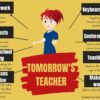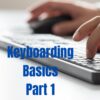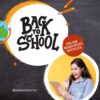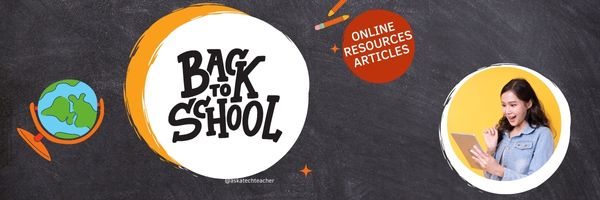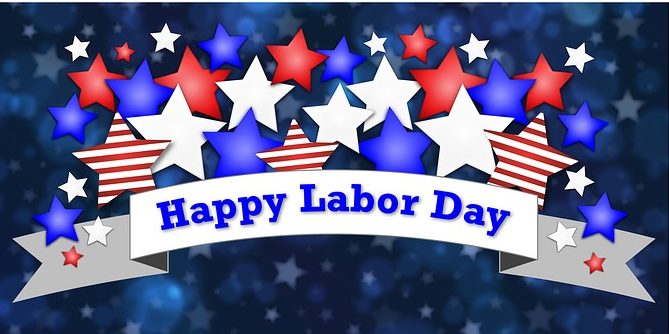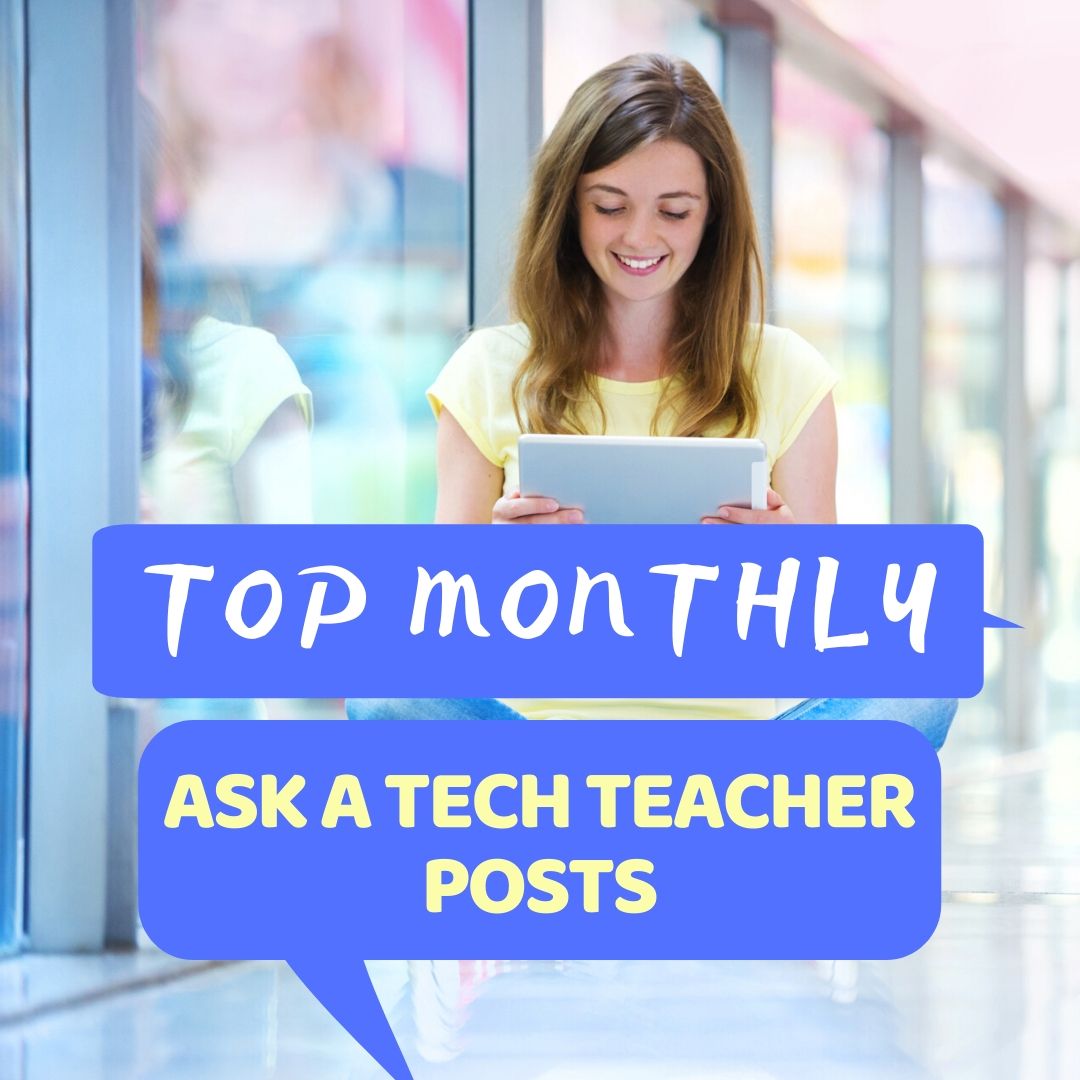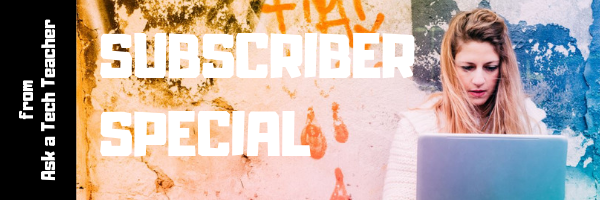
Author: Jacqui
Jacqui Murray has been teaching K-18 technology for 30 years. She is the editor/author of over a hundred tech ed resources including a K-12 technology curriculum, K-8 keyboard curriculum, K-8 Digital Citizenship curriculum. She is an adjunct professor in tech ed, Master Teacher, an Amazon Vine Voice, freelance journalist on tech ed topics, contributor to NEA Today, and author of the tech thrillers, To Hunt a Sub and Twenty-four Days. You can find her resources at Structured Learning.
Tech Tip #134: 8 Tips to Become Tomorrow’s Teacher
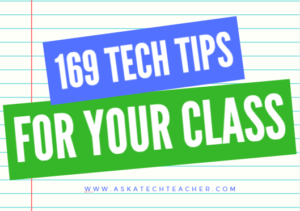 In these 169 tech-centric situations, you get an overview of pedagogy—the tech topics most important to your teaching—as well as practical strategies to address most classroom tech situations, how to scaffold these to learning, and where they provide the subtext to daily tech-infused education.
In these 169 tech-centric situations, you get an overview of pedagogy—the tech topics most important to your teaching—as well as practical strategies to address most classroom tech situations, how to scaffold these to learning, and where they provide the subtext to daily tech-infused education.
Today’s tip: 8 Tips to Become Tomorrow’s Teacher
Category: Pedagogy
Today’s teachers have little resemblance to your mother’s teachers—lecturing from the front of the classroom, silent children, and rote drills to reinforce skills. Today, teachers are expected to nurture inquiry, critical thinking, and independent thought, often assessed by projects or anecdotal observation.
Here’s a poster with eight tips on how to become tomorrow’s teacher today:
For more on tomorrow’s teacher, check out these articles on Ask a Tech Teacher:
- Let’s Talk About Habits of Mind
- What is the 21st Century Lesson Plan
- What’s Tomorrow’s Digital Student Look Like
- Set up Your Digital Classroom
Sign up for a new tip each week or buy the entire 169 Real-world Ways to Put Tech into Your Classroom.
What’s your favorite tech tip in your classroom? Share it in the comments below.
Share this:
- Click to share on Facebook (Opens in new window) Facebook
- Click to share on X (Opens in new window) X
- Click to share on LinkedIn (Opens in new window) LinkedIn
- Click to share on Pinterest (Opens in new window) Pinterest
- Click to share on Telegram (Opens in new window) Telegram
- Click to email a link to a friend (Opens in new window) Email
- More
50+ Websites on Keyboarding
Here are a wide variety of resources that teach keyboarding–from games to drills to everything in between:
- ABCYa–Keyboard challenge—grade level
- Alphabet rain game
- Alpha Quick–how quickly can a student type the alphabet?
- Barracuda game
- Big Brown Bear
- Bubbles game
- Digipuzzles–6 keyboarding practice games for youngers
- Edutyping–fee-based
- Free typing tutor

- GoodTyping.com
- KAZ–speed typing in 90 minutes
- Keyboard practice—quick start
- Keyboarding—more lessons
- NitroType
- TIPP 10
- Touch Typing Progressive Program
- Typaphone–make music while you type
- TypeDojo — word lists, 10-key, and more
- Typesy
- Typing Arena–lots of games to teach typing
- Typing Mentor
- Typing Pal
- Typing Tournament
- Typing.IO–typing code for practice
Graduated programs
For iPads
- Ghost Type
- Tap Fun Lite
- Tap Typing
- Typing Tournament–with teacher dashboard; includes games; fee
- Typetastic–also for computers
By row
Software
For Special Needs
Typing test
Lesson Plans
- 4 lesson plans–bundled
- Homeschool Keyboarding Kit
- K-5 Curriculum
- K-8 Curriculum
- Keyboarding and the Scientific Method
- Middle School Curriculum
Jacqui Murray has been teaching K-18 technology for 30 years. She is the editor/author of over a hundred tech ed resources including a K-12 technology curriculum, K-8 keyboard curriculum, K-8 Digital Citizenship curriculum. She is an adjunct professor in tech ed, Master Teacher, webmaster for four blogs, an Amazon Vine Voice, freelance journalist on tech ed topics, and author of the tech thrillers, To Hunt a Sub and Twenty-four Days. You can find her resources at Structured Learning.
Share this:
- Click to share on Facebook (Opens in new window) Facebook
- Click to share on X (Opens in new window) X
- Click to share on LinkedIn (Opens in new window) LinkedIn
- Click to share on Pinterest (Opens in new window) Pinterest
- Click to share on Telegram (Opens in new window) Telegram
- Click to email a link to a friend (Opens in new window) Email
- More
Keyboarding Basics Part 1
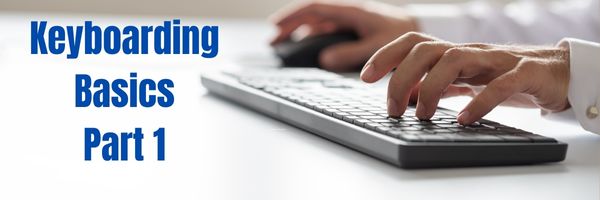 Keyboarding is a topic that most parents want their children to learn and many schools don’t have time to teach. Of all topics on Ask a Tech Teacher, keyboarding is the most visited. If you’re looking for a curriculum for your K-8 classes, here are two popular ones we offer:
Keyboarding is a topic that most parents want their children to learn and many schools don’t have time to teach. Of all topics on Ask a Tech Teacher, keyboarding is the most visited. If you’re looking for a curriculum for your K-8 classes, here are two popular ones we offer:
The Essential Guide–-a thorough K-8 curricula intended for schools that allot about 45 minutes a week to tech classes
The Ultimate Guide–a K-5 or MS comprehensive deep dive into keyboarding (optional student workbooks available)
We are taking the next two weeks–two articles–to answer the questions that should help you as a teacher or administrator decide what type of keyboarding program is best for your school.
Week 1 (this article)
- Why learn keyboarding?
- What is the best age to start teaching keyboarding?
- How important is teacher knowledge of teaching keyboarding?
Week 2 (click when available)
- What is the best way to teach keyboarding?
- What is the correct body position?
- What about keyboarding homework?
- Questions you may have
Share this:
- Click to share on Facebook (Opens in new window) Facebook
- Click to share on X (Opens in new window) X
- Click to share on LinkedIn (Opens in new window) LinkedIn
- Click to share on Pinterest (Opens in new window) Pinterest
- Click to share on Telegram (Opens in new window) Telegram
- Click to email a link to a friend (Opens in new window) Email
- More
America, We Remember
9-11 Day has become Patriot Day here in America, but it doesn’t change its purpose: to show how much we love our country.
[youtube=http://www.youtube.com/watch?v=6TPgJSZf5Vw&w=420&h=315]
What day in recent history do you remember most from your country?
Share this:
- Click to share on Facebook (Opens in new window) Facebook
- Click to share on X (Opens in new window) X
- Click to share on LinkedIn (Opens in new window) LinkedIn
- Click to share on Pinterest (Opens in new window) Pinterest
- Click to share on Telegram (Opens in new window) Telegram
- Click to email a link to a friend (Opens in new window) Email
- More
Back To School Websites
Here are a few of the popular resources teachers are using to
We write about back to school often on Ask a Tech Teacher. Here are some of the past articles I think you’ll like:
- 8 Tech Tools to Get to Know Your Students for Back to School
- 3 Apps to Help Brainstorm Next Year’s Lessons
- 11 Back-to-school Activities for the First Month of School
- Great Back to School Classroom Activities
- Plan a Memorable Back to School Night
- New School Year? New Tech? I Got You Covered
- 5 Top Ways to Integrate Technology into the New School Year
- 5 Ways to Involve Parents in Your Class
- 6 Tech Best Practices for New Teachers
- 5 Tech Ed Tools to Use this Fall
- How to Build Your PLN
- 5 Ways Teachers Can Stay on Top of Technology
- 5 FREE Web Tools for a New School Year
- Dear Otto: I need year-long assessments
- Great Activities for the First Week of School
Share this:
- Click to share on Facebook (Opens in new window) Facebook
- Click to share on X (Opens in new window) X
- Click to share on LinkedIn (Opens in new window) LinkedIn
- Click to share on Pinterest (Opens in new window) Pinterest
- Click to share on Telegram (Opens in new window) Telegram
- Click to email a link to a friend (Opens in new window) Email
- More
Tech Tip for Teacher-Writers #180–2 second way to find a book on Amazon
 Tech Tips for Teacher Writers is an occasional post on overcoming Tech Dread. I’ll cover issues that friends, both real-time and virtual, have shared. Feel free to post a comment about a question you have. I’ll cover it in a future tip.
Tech Tips for Teacher Writers is an occasional post on overcoming Tech Dread. I’ll cover issues that friends, both real-time and virtual, have shared. Feel free to post a comment about a question you have. I’ll cover it in a future tip.
This tip is to help you find books on Amazon country platforms not your home location. Say, a website guided you to a link in the US Amazon platform (amazon.com), but you want to buy the book in the UK. There’s a two-second way to get you across the world to whatever country you want.
Here’s the link for my latest prehistoric fiction in Amazon’s US platform:
![]()
The quickest way to move from the US to Britain’s Amazon platform is replace ‘com’ with ‘co.uk’ like this:
![]()
All I do is:
- double click ‘com’
- replace the highlighted letters with ‘co.uk’
It works the same way with any other country. You have to know the country’s international ID, but once you do, it’s simple to replace one with the other. I say it takes two seconds, but it could be faster.
Here’s my product page in the US Amazon
Share this:
- Click to share on Facebook (Opens in new window) Facebook
- Click to share on X (Opens in new window) X
- Click to share on LinkedIn (Opens in new window) LinkedIn
- Click to share on Pinterest (Opens in new window) Pinterest
- Click to share on Telegram (Opens in new window) Telegram
- Click to email a link to a friend (Opens in new window) Email
- More
Take a Break–it’s Labor Day!
Labor Day is annually held on the first Monday of September (this year, September 5th). It was originally organized to celebrate various labor associations’ strengths of and contributions to the United States economy. It is largely a day of rest in modern times. Many people mark Labor Day as the end of the summer season and a last chance to make trips or hold outdoor events.
Labor Day is a US holiday dedicated to workers across the country. The public holiday always falls on the first Monday in September. The first federal observation of the holiday occurred in 1894 however the first Labor Day observed in a state was in Oregon in 1887.
Here are websites to help students understand what Labor Day means to them:
- Child Labor
- Cybraryman’s Labor Day page--comprehensive as is his way
- History of Labor Day–Movie
- Labor Day activities, games, drawings for kids
- Labor Day infographic
- Labor Day’s Violent Beginnings
- PBS Kids: Labor Day
- Ten Labor Day Facts (from Forbes)
- Today in History (Labor Day)–from Library of Congress
- Why Americans and Canadians Celebrate Labor Day–YT video
Teacher-Authors: Here’s a post from last year for you.
Share this:
- Click to share on Facebook (Opens in new window) Facebook
- Click to share on X (Opens in new window) X
- Click to share on LinkedIn (Opens in new window) LinkedIn
- Click to share on Pinterest (Opens in new window) Pinterest
- Click to share on Telegram (Opens in new window) Telegram
- Click to email a link to a friend (Opens in new window) Email
- More
What You Might Have Missed in August–What’s up in September
Here are the most-read posts for the month of August:
- Tech Ed Resources–Coaching
- How to Thank a Teacher
- Benefits of a Short Course
- Notetaking and Study Apps
- Free Keyboarding Posters
- Essential Tech Tools for History Class
- Habits of Mind
- Which Digital Device Should I Use
- Lessons Learned my First 5 Years of Teaching
- Incorporate Podcasting Into Your Curriculum
Here’s a preview of what’s coming up in September:
- More Free Posters
- 8 Tips to Become Tomorrow’s Teacher
- Apps for Curious Students
- Fall Websites
- How to Evaluate Apps

Share this:
- Click to share on Facebook (Opens in new window) Facebook
- Click to share on X (Opens in new window) X
- Click to share on LinkedIn (Opens in new window) LinkedIn
- Click to share on Pinterest (Opens in new window) Pinterest
- Click to share on Telegram (Opens in new window) Telegram
- Click to email a link to a friend (Opens in new window) Email
- More
Subscriber Special: Free Amazon Gift Card
Every month, subscribers to our newsletter get a free/discounted resource to help their tech teaching.
September 2nd-3rd:
Subscribe to the Ask a Tech Teacher newsletter through Rafflecopter. Each new subscriber is entered in a contest to win a $10 Amazon card
a Rafflecopter giveaway
http://www.rafflecopter.com/rafl/display/ca9c2f912/?
Jacqui Murray is the author of the popular prehistoric fiction saga, Man vs. Nature which explores seminal events in man’s evolution one trilogy at a time. She is also the author of the Rowe-Delamagente thrillers and Building a Midshipman, the story of her daughter’s journey from high school to United States Naval Academy. Her non-fiction includes over a hundred books on integrating tech into education, reviews as an Amazon Vine Voice, a columnist for NEA Today, and a freelance journalist on tech ed topics. Look for her next prehistoric fiction, Natural Selection Fall 2022.
Share this:
- Click to share on Facebook (Opens in new window) Facebook
- Click to share on X (Opens in new window) X
- Click to share on LinkedIn (Opens in new window) LinkedIn
- Click to share on Pinterest (Opens in new window) Pinterest
- Click to share on Telegram (Opens in new window) Telegram
- Click to email a link to a friend (Opens in new window) Email
- More
Teacher-Authors: What’s Happening on my Writer’s Blog
A lot of teachers who read Ask a Tech Teacher are also authors so once a month, I share the most popular post from the past month on my writer blog, WordDreams. Here’s one that’s humorous while hitting close to the heart:
***
 At times, I wonder if I’m missing some critical piece required to be a Real Writer. I do a lot of the right things–
At times, I wonder if I’m missing some critical piece required to be a Real Writer. I do a lot of the right things–
- I read, a lot.
- I’m observant.
- I’m a loner (or, the flip side–I don’t mind being alone).
- I bloom where I’m planted.
But is that enough? I went in search of other traits successful friends have that might inform my endless quest to succeed in a craft that few can. Here’s what I found:
- Writers have a selective memory–they forget the bad stuff people say and remember the good. Otherwise, we get depressed.
- Writers are conversant with their muse–anywhere, any time, any subject. It doesn’t matter. When s/he starts talking, writers listen.
- Writers are tethered to their voicemail in case that Big Call from an agent comes through. If there is no call, they check to be sure their voicemail is working properly.
- Writers understand the importance of taking a break to do something fun, like read a book. If they are one of those unlucky folk who get writer’s block, this will suffice.
- Writers never show fear in front of their computer. It’s like a dog–it smells our distress. It’ll then do nasty things like crash in the middle of a scene or corrupt your file.
- You can tell a lot about a writer by the way he/she handles three things: rejection, fame, and a change in their schedule.
- In golf, one of 14 clubs has to be the right decision. In writing, all 14 are wrong because readers want unique.
- Writers don’t want to be judged by what s/he does between the lines.
- Writers believe in the impossible, in miracles, and in Santa Claus. They will spend hours on a paragraph, or sentence, and consider it time well spent.
- To rephrase Voltaire: “No problem can stand the assault of sustained thinking from a writer.”
- Where the engineer thinks of his equations as an approximation to reality, and the physicist thinks reality is an approximation to his equations, the writer thinks it doesn’t matter if the prose are elegant.
Share this:
- Click to share on Facebook (Opens in new window) Facebook
- Click to share on X (Opens in new window) X
- Click to share on LinkedIn (Opens in new window) LinkedIn
- Click to share on Pinterest (Opens in new window) Pinterest
- Click to share on Telegram (Opens in new window) Telegram
- Click to email a link to a friend (Opens in new window) Email
- More

